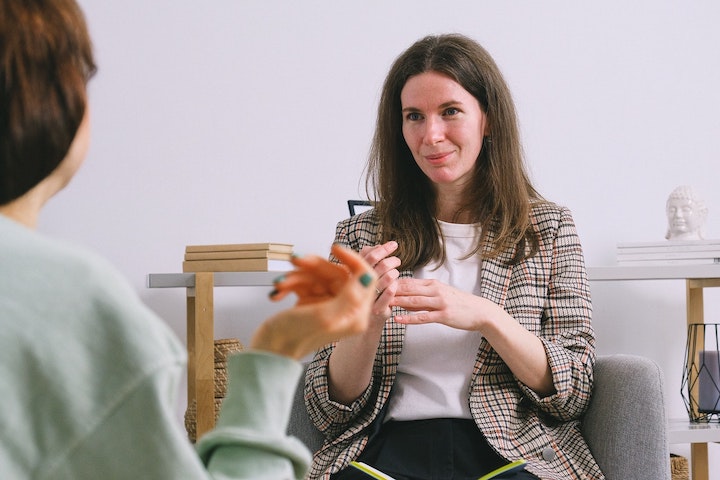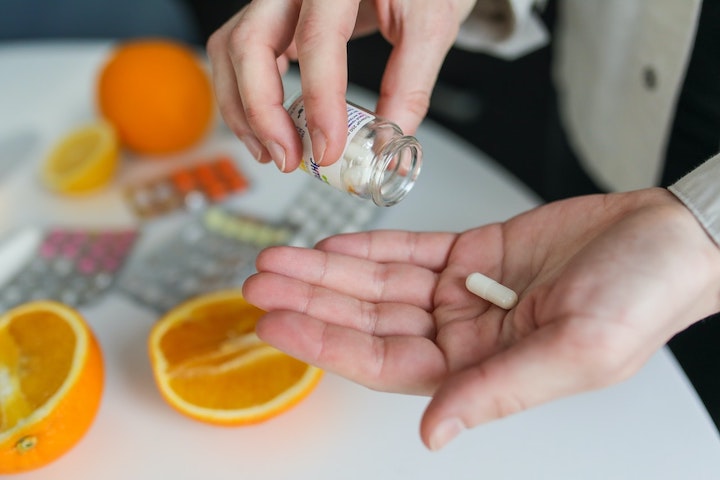Are you wondering whether you or someone you love has ADHD? It’s a condition reported to affect 2.6 million people in the UK, [1] both adults and children.
For those who have it, its symptoms thoroughly affect everyday life, and for many people it can be frustrating.
Understanding more about it can help you understand and manage it better and play to your strengths.
There are symptoms that are very common, perhaps you might recognise some.
Think you might be suffering from ADHD? Talk to our team on 0800 140 4690

It’s helpful to think about how you navigate your daily activities and tasks.
How you go about this is likely to shed some light on symptoms and whether you have ADHD.
Interestingly, there are both inattentive and hyperactive symptoms of ADHD and these can present quite differently in individuals.

The inattentive type of ADHD is characterised by an impaired ability to maintain directed attention.
For instance, if a person has let their house get messy and they really want to tidy it up, they’ll require certain parts of the brain to get this done.
Following a process to put items away and be organised requires executive functioning and control over this.
For a person with ADHD, executive control is impaired so directed attention becomes a real challenge.
Couple this with a distraction, such as a phone call, a knock at the door, or the sun coming out behind the clouds, and the person is much more likely to follow automatic attention that doesn’t require controlling executive functioning.

It’s very clear to identify hyperactivity from the way it presents in behaviour and energy.
Hyperactivity in children is usually identified in classrooms because these are controlled and often quiet environments where behaviour is usually expected to be calm.
Hyperactive behaviour is often labelled as disruptive.
For adults, hyperactivity looks a bit different. People might appear rushed, fast, restless, anxious and overwhelmed.
Remember, hyperactivity isn’t present for everyone who has ADHD
While attention-deficit/hyperactivity disorder has “hyperactivity” in its name, it doesn’t mean that all people with the condition will experience these symptoms.
It’s commonly assumed that people with ADHD will,l but that’s not the case. Actually, it’s more usual for people to experience combined ADHD, meaning they’ll feel inattentive and hyperactive symptoms at different times.
For others, it will just be the inattentive symptoms.
To learn more about the signs and symptoms of ADHD, give our team a call on 0800 140 4690

Sadly, for many people who have ADHD much of their life is negatively impacted.
Due to how so many aspects of thoughts and behaviours are affected, the consequences ripple out.
Due to how ADHD causes impaired concentration, procrastination, forgetfulness and time management, this can make getting work completed really difficult.
In both educational environments and the workplace, this can have seriously negative effects and make it tricky to maintain jobs.
ADHD characteristics affect social interactions. It’s quite easy for people with ADHD as well as their partners to report a complex or complicated relationship.
This is often linked to issues around communication.
Impulsivity, finding it difficult to listen and focus, and being impatient, for instance, can have a knock-on effect to all people around the person with the condition.
An interesting topic to consider is that ADHD is often present as a comorbid condition presenting with anxiety disorders, other mood disorders, and substance misuse.
It’s really important to have a healthcare professional involved in these circumstances around mental health.
Another area that is useful to keep in mind is that the propensity around disruptiveness and restlessness can be linked to criminality and other safety issues. [2]
It’s especially more challenging to manage outcomes without knowledge, understanding, and support. Many people can also make great use of specialised medications to help them get a firm grip on these issues.
Think you might be suffering from the negative impacts of ADHD and need support? Call us today on 0800 140 4690

One thing that’s essential to remember is that living with ADHD comes with many strengths.
Unfortunately, due to the way society is and how environments have been built around the neurotypical mind, this can be forgotten.
ADHD can come with many benefits which can become especially useful in certain situations.
Learn all about ADHD by calling us today on 0800 140 4690

The main causes of ADHD include:
There are various risk factors associated with being more likely to develop ADHD.
These include having blood relatives who also have it, or suffering from other mental health disorders.
Smoking and using substances during pregnancy can increase the risk, as can being exposed to toxins in childhood such as lead.
To learn more about the root causes of ADHD, call us today on 0800 140 4690

There are many ways you can help yourself.
Developing a healthy lifestyle has a really positive influence on your mental and emotional self.
It’s useful to look after your physical health through regular exercise, especially if you’re prone to hyperactive symptoms.
You can also eat healthy, balanced meals and keep fizzy drinks, alcohol and caffeine to a minimum.
Doing these things helps to keep brain chemicals and hormones balanced and helps avoid emotional dysregulation, which might exacerbate ADHD symptoms.
In terms of self-management, you can work on developing time management and organisation skills by keeping a notice board up clearly on the wall, or having a physical diary or calendar out on display.
Get the help you need to properly manage ADHD and any related issues by calling us on 0800 140 4690

There are those who self-manage ADHD and this works for many.
It has to be said, though, that many people require treatment options.
If your life is being negatively impacted or you’re struggling mentally or emotionally as a result of ADHD symptoms, then it’s important to seek professional help.
This is especially vital in the presence of co-existing conditions.
Call our expert team today on 0800 140 4690

Substance use disorders are characterised by a loss of control over the use of alcohol and drugs.
This can happen slowly over a period of time. Many people with ADHD develop addictions as a way of self-medicating.
It’s quite common for people to seek out speed, for example, which similar to Ritalin (a medication prescribed for ADHD by GPs).
Of course, it’s really important when treating ADHD to find the right medication and dose for your particular needs.
A doctor can do this. Alongside a drug and alcohol team, you can be supported to wean off substances while being supported to find a helpful prescription to manage ADHD symptoms.
If you’re struggling with alcohol or drug use, it’s essential to get help. You can contact the Rehab 4 Addiction team for personalised advice.
Our team can discuss with you the local options in your area for treatment suitable for substance use alongside ADHD.
Find the support you need to manage addiction at a drug and alcohol rehab by calling us on 0800 140 4690

Psychotherapy and counselling are instrumental in supporting people in learning emotional regulation techniques and in being able to reach a place of self-compassion and self-acceptance.
There is a lot of work to be done in sessions through conversation, reflection, and sometimes through guided activities.
ADHD, mood disorders, and substance addiction are all effectively treated by therapists and counsellors.
There are different types of therapy. These can be accessed privately, through rehab clinics, and through the NHS, though there are often long waiting lists in the latter case.
Types of therapy include: CBT, Gestalt, person-centred, humanistic, psychodynamic, integrative and much more.
Experience the benefits of therapy for yourself by giving us a call on 0800 140 4690

There are many different types of medication that can be prescribed in the treatment of ADHD.
They can make a huge difference for people.
A person might find that they finally feel relaxed and can focus and get on with work with greater ease than ever before.
As with all medications, side effects are a risk. It’s important to remain in contact with the doctor who prescribes the medication in order to monitor your physiological responses.
Some people will try a few different sorts under medical guidance until they find one that suits them, whilst others will be lucky enough to receive the right dose straight away.
Find the right medical support you need to manage ADHD by giving us a call on 0800 140 4690

ADHD is a condition that will have been present throughout the person’s life. It isn’t suddenly triggered in later life, although circumstances in adulthood can make it easier to identify ADHD symptoms for some people.
While you can complete questionnaires and quizzes online, to get an actual diagnosis you’ll need an interview and assessment with a healthcare professional.
You can get these through the NHS, although the waiting lists are very long. Alternatively, many people pay for a private diagnosis.
It really depends on the individual and their personal interests. However, people with ADHD can be excellent at coming up with ideas, being creative, thinking outside of the box, responding reliably in crisis moments, and also having deep knowledge in areas that interest them.
Think you might be suffering from ADHD? Talk to our team on 0800 140 4690

ADHD is a mental health condition that affects millions of people. For some, it’s not identified until adulthood.
There are tell-tale symptoms to look out for, including those that are both inattentive and hyperactive in nature.
While ADHD offers several strengths, it can also negatively impact a person’s life.
When this happens often, it’s important to seek help from healthcare professionals to learn how to manage it through medication, therapies, and self-management.
Get the help that you need today by giving us a call on 0800 140 4690